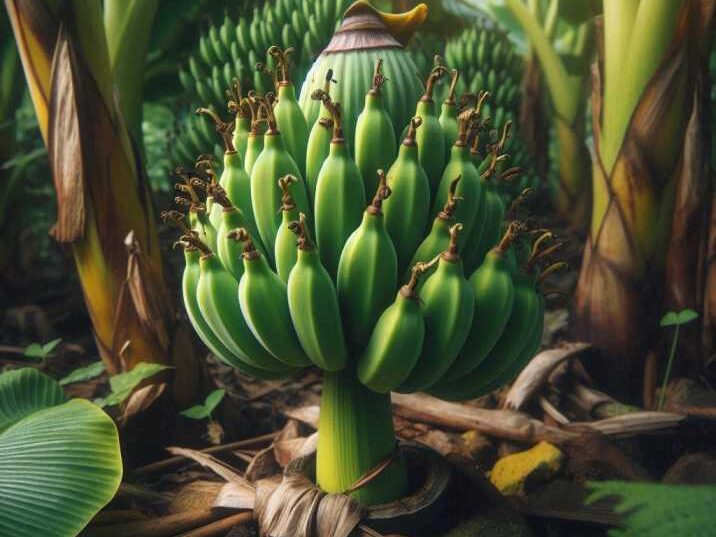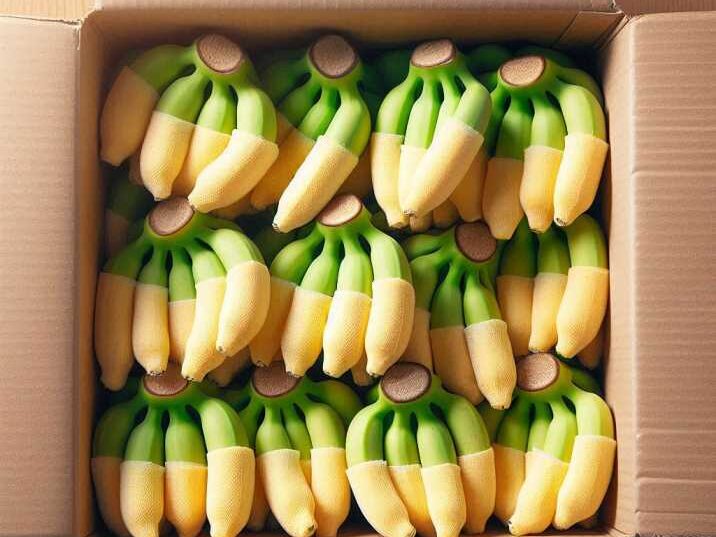Introduction
Table of Contents
Baby bananas, often called “finger bananas” or “lady finger bananas,” are not only a delicious and nutritious tropical fruit but also play a significant role in the global export market of tropical fruits. These small, sweet bananas are highly sought after for their unique taste and versatility, making them popular in many regions around the world. Their increasing demand has led to a surge in production and exports, particularly from tropical countries. In this article, we will explore how baby bananas contribute to the export market, their economic impact, and why they are vital to the growth of the tropical fruit industry.

What Are Baby Bananas?
Baby bananas are a variety of banana that is smaller than the typical Cavendish bananas. They are sweeter, creamier, and rich in essential vitamins like vitamin C, potassium, and dietary fiber. Baby bananas are typically grown in tropical regions with warm climates and fertile soil, making them an ideal crop for export.
Key Characteristics of Baby Bananas
- Size: Around 3-4 inches long.
- Taste: Sweeter than regular bananas with a rich flavor.
- Texture: Creamy and smooth.
- Nutritional Value: High in vitamins, fiber, and minerals like potassium.
These unique qualities make baby bananas a highly attractive product for export markets across the globe.
Why Are Baby Bananas in Demand in Global Markets?
Baby bananas have been gaining popularity for several reasons, contributing to their growth in the tropical fruit export market:
Health Benefits
With a growing global emphasis on health and wellness, baby bananas have become a favorite due to their high nutritional value. They are packed with vitamins, minerals, and fiber, making them a perfect snack or ingredient in various dishes.
Versatile Culinary Uses
Baby bananas are used in a wide range of culinary applications. They are not only eaten fresh but are also a popular ingredient in desserts, smoothies, and savory dishes. Their natural sweetness and small size make them ideal for portion-controlled snacks.
Consumer Preferences for Unique Fruits
In recent years, consumers have shown a strong interest in exotic and unique fruits. Baby bananas are seen as a specialty item in many parts of the world, driving demand in both grocery stores and high-end food markets.
How Baby Bananas Contribute to the Tropical Fruit Export Market
Economic Impact of Baby Banana Exports
Baby bananas are part of the larger tropical fruit export industry, which includes other popular fruits like mangoes, pineapples, and papayas. Tropical countries rely heavily on fruit exports for economic growth, and baby bananas are a significant contributor to this sector.
According to trade statistics, banana exports, including baby bananas, account for a substantial portion of the revenue generated by tropical fruit exports. As demand continues to rise, countries that produce baby bananas have the opportunity to tap into new markets and expand their agricultural output.
Countries Leading the Export of Baby Bananas
Several tropical countries are known for their high production and export of baby bananas. These include:
- Ecuador: One of the world’s largest banana exporters, Ecuador plays a leading role in the export of both regular and baby bananas.
- Philippines: Another major banana-producing country, the Philippines has seen a surge in the demand for its baby bananas.
- Costa Rica: Known for its high-quality tropical fruits, Costa Rica exports a significant quantity of baby bananas to global markets.
Key Export Destinations
Baby bananas are exported to various regions, including North America, Europe, and parts of Asia. The increasing demand for organic and healthy fruit options has boosted the sale of baby bananas in supermarkets and specialty stores worldwide.
Challenges in the Baby Banana Export Market
Despite the growing popularity of baby bananas, there are several challenges faced by the export market:
Climate Change
Tropical fruit crops like baby bananas are sensitive to climate conditions. Unpredictable weather patterns, droughts, and extreme rainfall can negatively impact production and export levels.
Transportation and Storage
Since baby bananas are delicate and perishable, they require careful handling during transportation. Ensuring that the fruits reach international markets in good condition can be a logistical challenge.
Price Fluctuations
The global fruit market is subject to price fluctuations based on supply and demand. If there is an oversupply of baby bananas, prices can drop, affecting the profitability of exports.
The Future of Baby Banana Exports
Looking ahead, the demand for baby bananas is expected to grow even further. Consumers are becoming more health-conscious, and exotic fruits like baby bananas will likely become a staple in many households around the world.

Opportunities for Growth
- Organic farming: More consumers are opting for organic produce, and baby bananas grown without pesticides can tap into this premium market.
- Sustainability: As awareness of environmental issues grows, the use of sustainable farming practices can enhance the reputation of baby bananas in the global market.
Table of Information: Baby Banana Export Statistics
| Country | Annual Baby Banana Export (in tons) | Key Export Markets | Challenges |
|---|---|---|---|
| Ecuador | 250,000 | North America, Europe | Climate change, transportation costs |
| Philippines | 200,000 | Asia, Middle East, Europe | Price fluctuations, logistics |
| Costa Rica | 180,000 | North America, Europe | Climate conditions, market competition |
| Colombia | 120,000 | Europe, Middle East | Quality control, storage |
Conclusion
Baby bananas are a vital component of the tropical fruit export market, contributing significantly to the economies of producing countries. Their increasing demand for their sweetness, nutritional value, and versatility has opened up opportunities for tropical countries to expand their exports. As the world becomes more health-conscious, the future of baby banana exports looks promising, with a focus on organic farming and sustainability driving growth.
5 FAQs About Baby Bananas in the Export Market
- What are baby bananas?
Baby bananas are a smaller, sweeter variety of bananas that are popular for their unique taste and high nutritional value. - Which countries export baby bananas?
Countries like Ecuador, the Philippines, Costa Rica, and Colombia are major exporters of baby bananas. - Why are baby bananas in demand?
They are in demand due to their health benefits, sweet flavor, and versatile culinary uses. - What are the challenges of exporting baby bananas?
Challenges include climate change, transportation issues, and price fluctuations in the global market. - What is the future of baby banana exports?
The future looks bright with increasing demand, especially for organic and sustainably farmed baby bananas.
